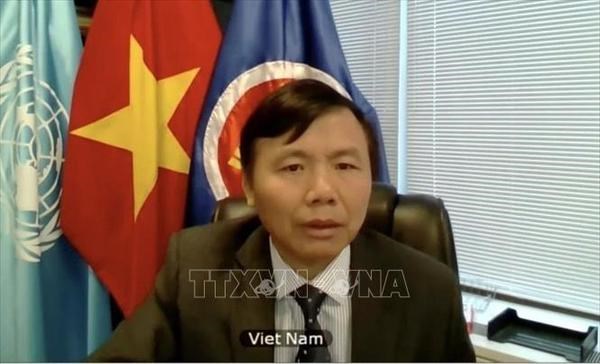 |
|
Ambassador Dang Dinh Quy, Permanent Representative of Vietnam to the UN
|
Quy was addressing an UN Security Council (UNSC)’s videoconference Arria-formula meeting on February 24 themed “Upholding the collective security system of the UN Charter: the use of force in international law, non-state actors and legitimate self-defense” with the participants of nearly 30 member countries of the UN Security Council and the UN.
He stressed that all countries are obliged to build friendship relations and form a culture of upholding the UN Charter and international law as well as abiding by principles in sovereignty and territorial integrity, not interfering into internal affairs of other states, not using or threatening to use force, and dealing with disputes peacefully.
The diplomat said that the UNSC should work to enhance the observance of international law and promote the role of international law and UN Charter as a vital tool in maintaining international peace and security, while increasing its coordination with regional organisations and international legal agencies in coping with disputes, maintaining peace and preventing conflicts.
He underlined the need to avoid the abuse and re-explanation of the UN Charter, suggesting the UNSC continue to creating favourable conditions for countries to get access to affairs and documents of the council to promote open and transparent discussions in the field.
Noting that this topic has been mostly discussed among scholars, Naz Modirzadeh, Director of the Harvard Law School Programme on International Law and Armed Conflict, said that all countries are authorised and responsible in building international law, including the responsibility in protecting the principle of not using force.
She proposed that all countries should actively engage in open discussions on the theory of the rights to self-defence and improve the capacity to get access to announcements and discussions at the UNSC in the field.
Participants at the event underlined the principle of not using or threatening to use force, which is a foundation for the collective security system in line with the UN Charter and the UNSC's function in maintaining international peace and security.
They affirmed that the only exception is the case that is allowed by the UNSC or to implement the right to self-defence. They called for the upholding of the UN Charter in maintaining international peace and stability, while exchanging ideas on the explanation and application of Article 51 of the UN Charter on the legal basis for the use of force as a means of self-defence, as well as on the situation in specific countries and regions./. VNA